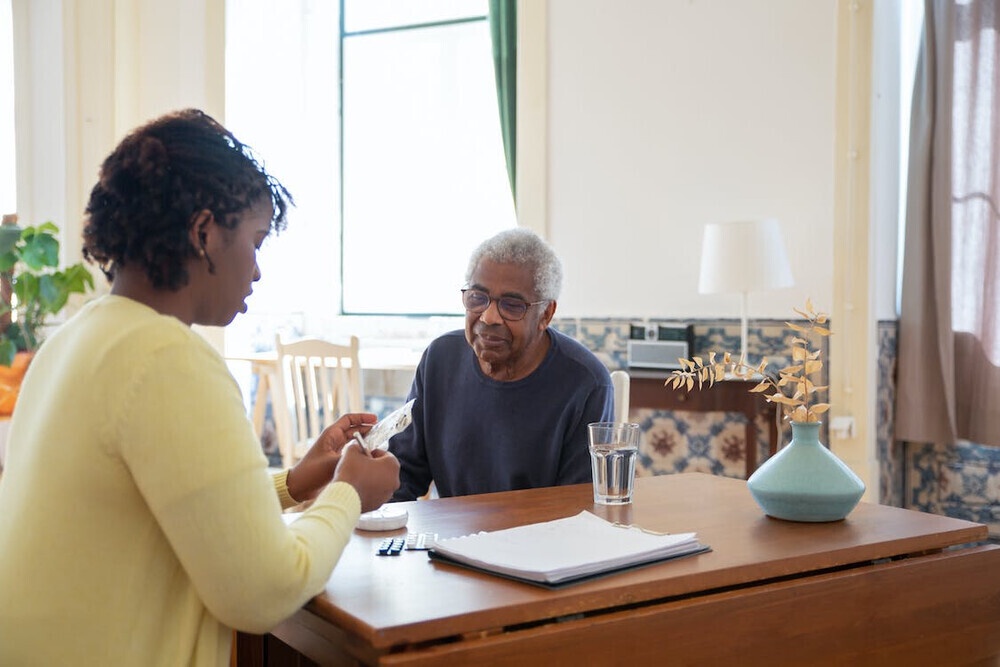
A traumatic brain injury can be a result of a sudden sharp blow to the head or a forceful that causes the body to shake violently.
These injuries can either be penetrating like a gunshot wound or non-penetrating injuries like scalp wounds or skull fractures.
TBIs are most likely to happen to people older than 65 since they are more prone to falling after losing their balance and hitting their heads. This can lead to cognitive and communication challenges, making the individual feel isolated and misunderstood. This is when they require appropriate care and emotional and social support to manage their mental health symptoms and recover from their injuries.
If you’re looking for ways to enhance connection and communication with a TBI patient, we have some tips for you.
Keep reading to learn how you can provide appropriate emotional care and support to TBI patients.
Cognitive and Behavioral Changes in TBI Patients

Before one can begin to effectively communicate with a TBI patient, it’s good to educate oneself about their mental and physical health condition to become more aware of how they must be feeling.
Here are some cognitive and behavioral changes TBI patients commonly experience.
- Changes in sleep pattern
- Disorientation and profound confusion
- Irritability
- Frustration
- Memory problems
- Problems with concentration, paying attention, and making decisions
- Loss of consciousness from time to time
Some of their physical symptoms include:
- Slurred speech
- Recurring headaches
- Blurred vision
- Seizures and convulsions
- Nausea
- Neurological deficitslike weakness in the arms and legs and loss of balance
- Unequal pupil size
TBI patients also experience changes in perception and sensation:
- Sensitivity to sound and light
- Feeling depressed and anxious
- Vertigo, lightheadedness, and dizziness
- Hearing problems
- Drowsiness and fatigue
- Lack of motivation and energy
How to Enhance Connection and Communication with TBI Patients

Communication is important when it comes to helping your loved ones or patients with TBI make progress with their recovery.
Developing a bond of mutual understanding and good communication can make a huge difference in an individual’s health and healing process. Every TBI patient needs someone they can trust and rely on to help them with their everyday activities and help them feel cared for and supported.
Here are some ways you can help.
Practice Active Listening
One of the first things you need to practice when improving communication skills with TBI patients is practicing active listening. Active listening sounds like easy work, but it is more challenging than you might think.
Here are some ways to listen more actively.
- Give the person your undivided attention
- Avoid interrupting them or passing criticism
- Clear your mind of any judgment or distraction
- Show positive body languageand show the person that you’re really listening
- Have some open-ended questions prepared beforehand that help you elicit more information
Watch Your Tone
Many people don’t realize this, but watching your tone is super important when it comes to enhancing communication.
The tone you use and how you say a sentence can add emphasis and power to your message,
Even poorly chosen words with negative connotations can result in misunderstandings.
TBI patients can be a little more sensitive because of their behavioral and mental health challenges, which is why you need to be more mindful of your tone and the message you’re conveying.
Get to Know Them and Their Condition Better
Learning and educating oneself about a TBI patient’s health condition can help improve care. You can start by showing respect for their direct and indirect needs and making sure that you’re providing patient-centered care.
Acknowledge and address their concerns; don’t dismiss them or invalidate their experiences.
Do your research and find out as much as you can about their condition.
Make sure you’re also involving other family members and friends to reduce their stress and anxiety. Encouraging social interactions and engagement with others is incredibly effective in helping people heal and recover faster.
Be Patient

Last of all, be patient. To communicate more effectively with your loved ones with TBI, you need to practice being more empathetic and patient. Most people with TBI have both physical and cognitive difficulties, which can make it harder for them to understand and grasp things. This can make their caregivers frustrated or overwhelmed. But remember, as a caregiver, you need to be able to provide them with the love, support, and care that they require with kindness and patience.
Are you on the lookout for qualified and well-trained in-home caregivers in Marion County, Indianapolis? Get in touch with King’s Grace Homecare today.
King’s Grace Homecare has a team of reliable and professional caregivers offering comprehensive and well-rounded nursing care services for TBI patients and aging individuals.
Reach out to them today to learn more about their home care services.
About the Author
Michael J. is a licensed and professional caregiver who has been a part of the industry for the last 15 years. Due to his experience and work with numerous TBI patients, the author likes to write comprehensive blogs to help people understand the best ways to help TBI patients manage their symptoms.


No comments yet